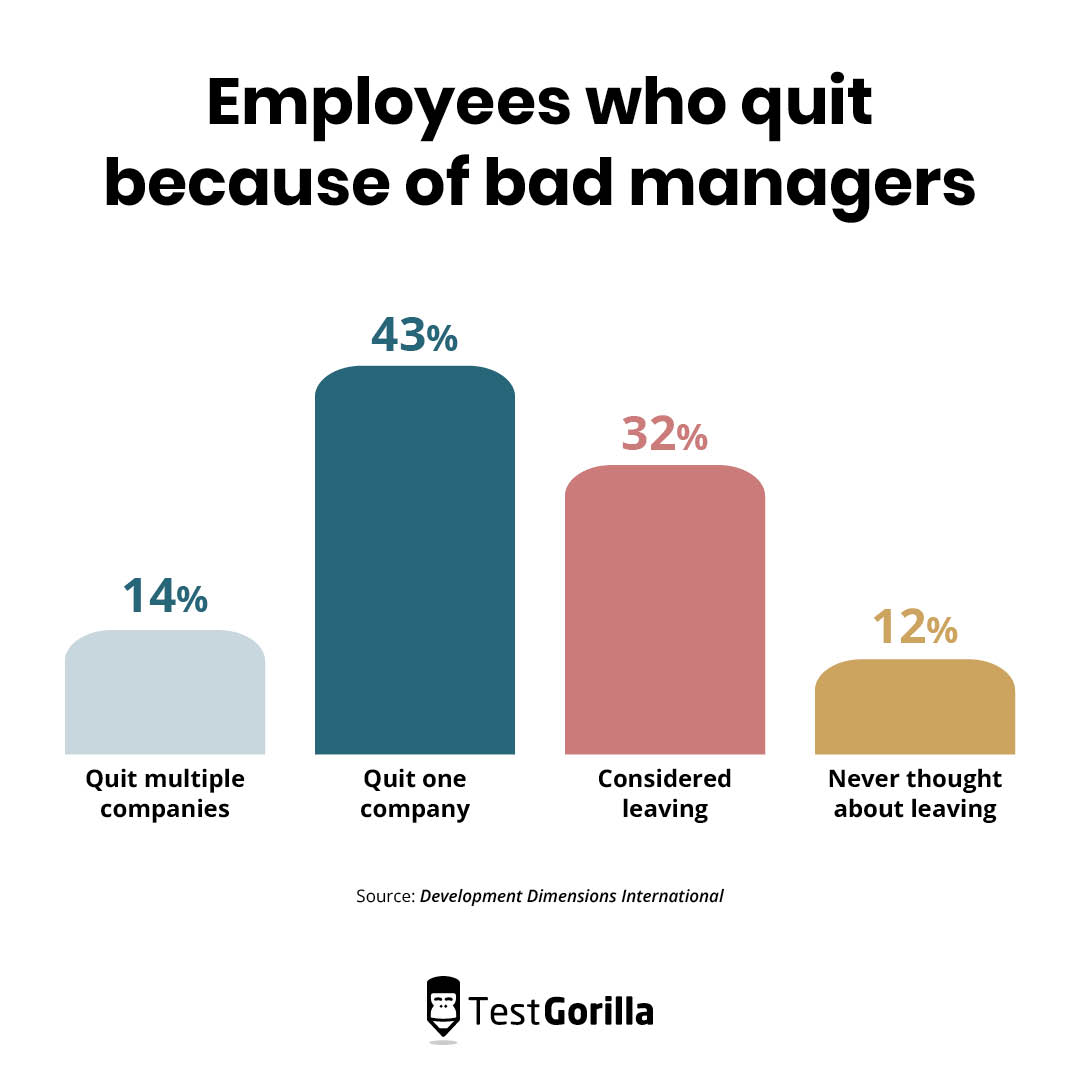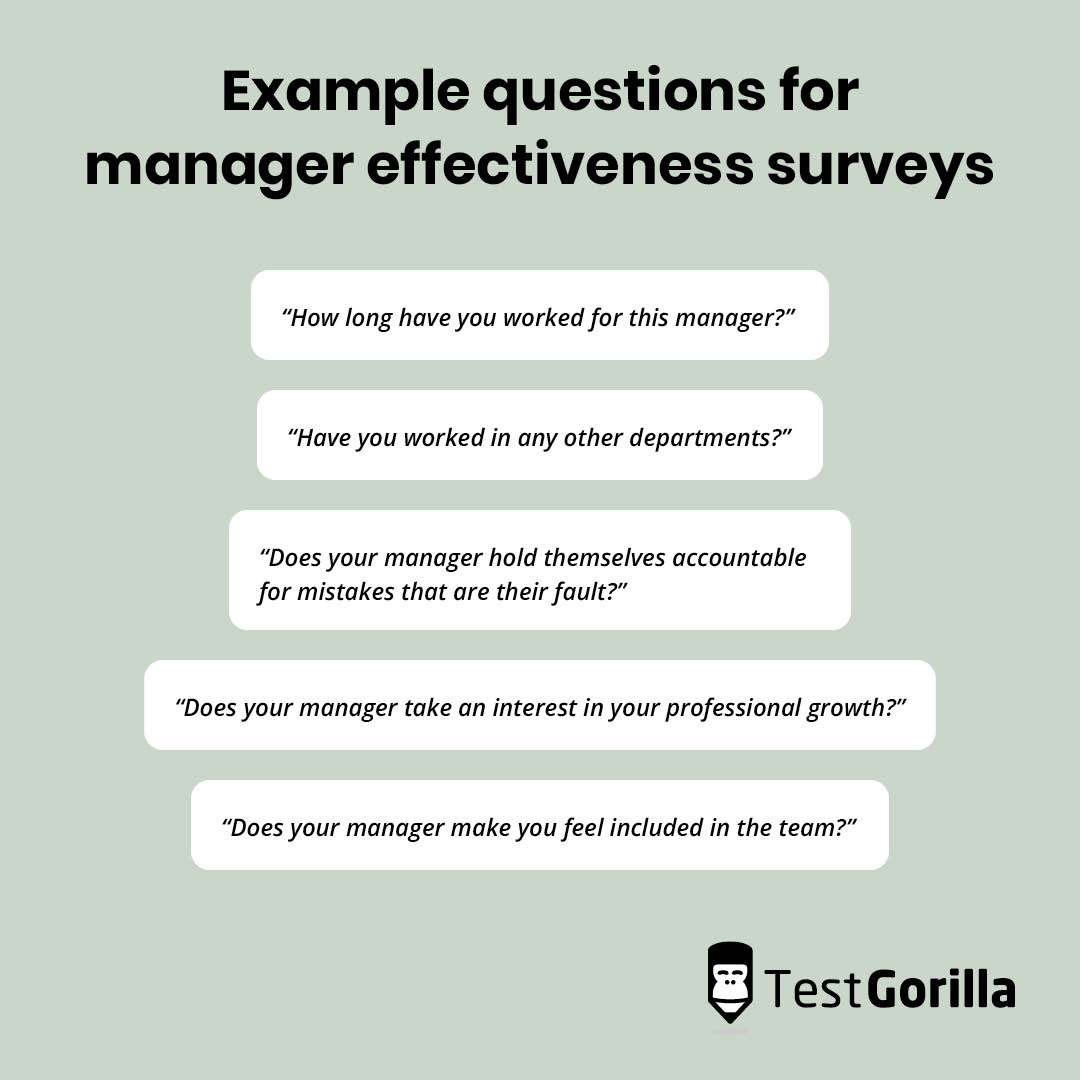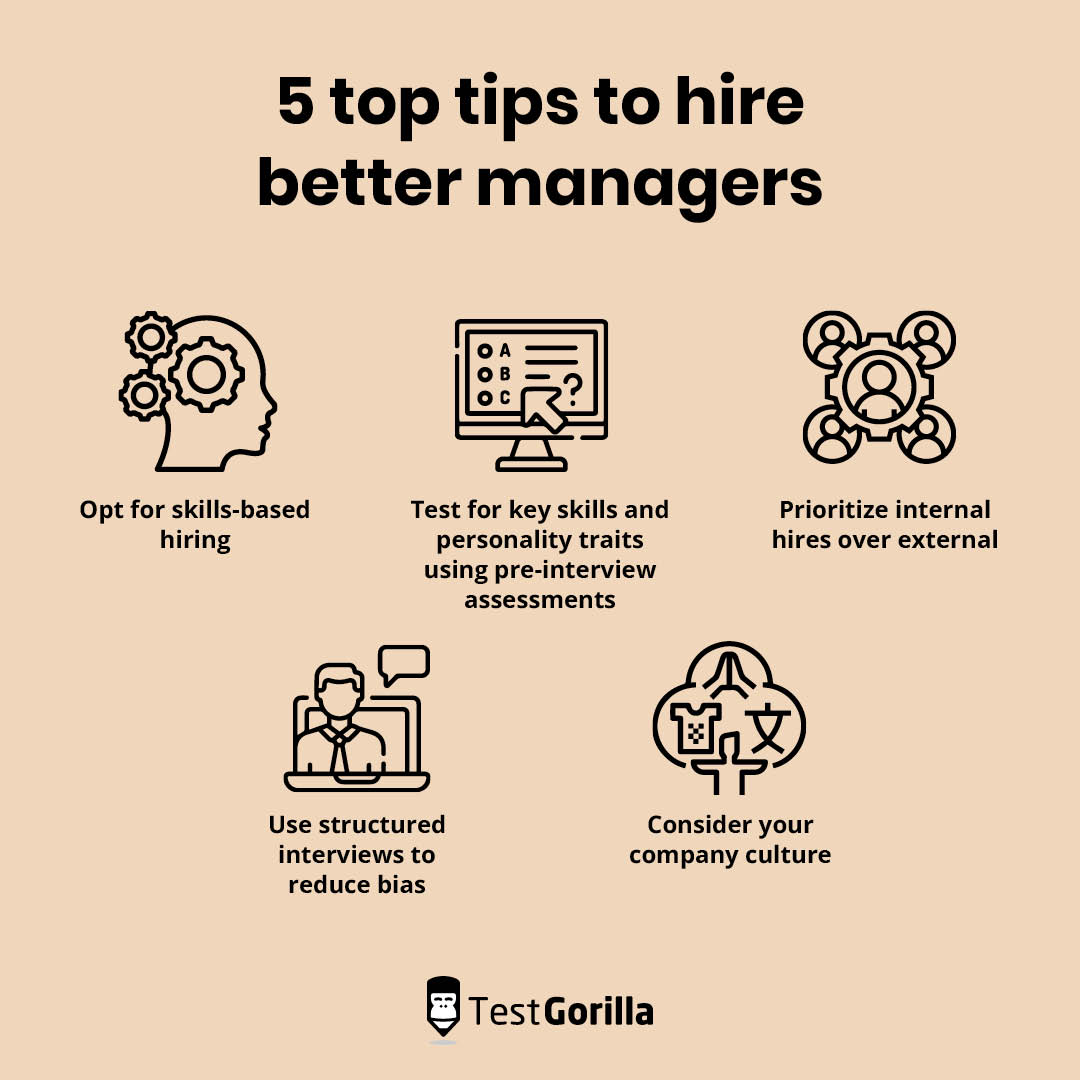How to be a good manager (and how to hire one): A guide for HR professionals
Effective management drives an organization forward by supporting its people and providing solid leadership.
Managers who lack key skills negatively affect those around them, causing disengagement, a loss in morale, and high turnover.
Learning how to be a good manager has far-reaching benefits and a powerful impact.
A great manager develops and recognizes what makes their team unique, and this support improves their company and makes it a place where people want to work.
This article describes the characteristics of a great manager, including communication, accountability, and the ability to create an inclusive workplace.
Then we show you how to develop these skills across your organization and hire the right managers who possess these capabilities through skills-based hiring.
How to be a good manager: 10 effective management skills
What makes a good manager?
Markus Buckingham, a writer for Harvard Business Review, describes a good manager as someone who discovers and celebrates the diverse skills in their team.[1]
We believe this summarizes effective management because managers should uplift and support the people who work for them.
Let’s take a look at the essential skills that set a good manager apart.
Summary
Skill | Description |
Forgets about one-size-fits-all management styles | Managing individual employees and playing to their strengths is essential for their satisfaction and performance |
Makes sure to treat everyone fairly | It’s vital to create a fair environment with no favoritism or preference |
Communicates goals and expectations clearly | Proper communication lets staff know what’s expected and what they’re doing right |
Avoids the urge to micromanage and spoon-feed solutions | Taking a step back and trusting employees makes them feel respected and valued |
Delegates tasks effectively | Knowing employees well enables a manager to delegate tasks to the right people |
Keeps employees engaged and motivated | Recognizing and acknowledging employees is critical to keeping them engaged |
Creates a positive, inclusive work environment for your staff | Building an inclusive workplace makes employees feel appreciated and boosts diversity |
Coaches employees | Coaching and mentoring workers helps them build the right skills and provides valuable direction |
Asks for feedback and is self-aware | Seeking feedback and staying accountable creates a leader focused on humility and improvement |
Cares about employees as people, not just business resources | Managers must remember to care about employees as human beings, inquire into their lives, and help where they can |
1. Forgets about one-size-fits-all management styles
Employees have different personalities, work styles, learning speeds, strengths, and weaknesses.
A great manager must say goodbye to a blanket approach and manage each individual in a way that suits them.
Here are a few things a good manager should do for their staff:
Get to know them
Treat each of them as an individual
Work to find and leverage their strengths
Help them grow in areas that need improvement
Focusing on each staff member’s individual development and growth is one of the most crucial qualities of good management.
The ability to connect individual development with overall organizational goals benefits the organization and boosts employee satisfaction and retention.
In fact, 94% of employees say they would stay at a company longer if it invested in their professional development.
2. Makes sure to treat everyone fairly
Managers should treat everyone under them fairly without favoritism or preference.
For example, office workers shouldn’t get better treatment than remote staff because of proximity bias.
Every member of your staff should feel respected, valued, and heard.
Managers can facilitate this by involving their team in important decisions. This makes workers feel trusted and empowered.
One study showed that 74% of American workers prefer a collaborative work environment where they’re involved in decisions.[2]
Building a safe, fair environment improves the team’s opinion of both their manager and each other, reducing the chance of resentment between peers.
This means that ensuring fair treatment is pivotal to building a successful collaborative work environment.
3. Communicates goals and expectations clearly
Managers should clearly and frequently communicate goals, expectations, and feedback to their staff.
Employees need feedback for growth, and clear expectations promote honesty and transparency.
Workers value honest communication – and the ramifications of not having it may be worse than you think.
A study by Development Dimensions International showed that 57% of employees have quit because of a bad manager. A further 32% have considered leaving because of their manager, and only 12% have never considered it.
The same study showed that the top areas managers struggle with are communication, coaching, and engaging their team members.
Communication skills are among the most important a manager can possess and can determine whether employees stay with the business or leave.
4. Avoids the urge to micromanage and spoon-feed solutions
A helicopter manager can quickly demotivate and disengage staff. Micromanagement is associated with low employee morale and productivity, high turnover, and other negative effects in the workplace.
No employee likes to be micromanaged. In this modern era, the name of the game is worker autonomy, and employees desire a certain degree of freedom.
Autonomy builds employees’ confidence and helps them to be more self-sufficient, which also boosts self-motivation.
A manager who steers clear of micromanaging their employees shows that they trust their capabilities. This, in turn, makes team members feel appreciated and respected.
The more trust a manager puts in their employees, the more they repay that trust.
Nurturing trust in the workplace is essential for a functioning work environment. It promotes a healthy company culture, increases collaboration, and boosts worker loyalty. To read more, check out our blog post on why trust is important in the workplace.
5. Delegates tasks effectively
Delegating the right tasks to the right people is an important part of effective management.
This means knowing the available resources, capacity, and skill sets and how to best use them to complete all the work that needs to get done.
This ties heavily into our first point because knowing a team’s strengths and weaknesses enables a manager to properly leverage its capabilities when assigning tasks.
Effective delegation not only improves overall team performance but also helps complete business processes more smoothly. By assigning tasks to the right people, managers can ensure they are performed more efficiently and successfully.
This, in turn, increases employees’ trust in the manager and improves working relationships. An employee likes to know that their manager can do their job efficiently and skillfully and aren’t just “getting by.”
6. Keeps employees engaged and motivated
Managers play a crucial role in employee engagement and motivation.
Great managers are there to support their people. They should uplift and motivate their team members to ensure they don’t grow distant and end up quiet quitting.
This means they should give regular, timely recognition for hard work in the form of frequent praise and spot awards. Recognition is one of the biggest drivers of employee satisfaction.
Great management should also focus on keeping morale up. For more information on this, read our guide on fun ways to boost morale at work.
7. Creates a positive, inclusive work environment for their staff
An effective leader is an integral part of a positive work environment, and that means including and accepting every member of their staff.
Older employees shouldn’t face discrimination. Neurodivergent employees should have access to accommodations.
An inclusive work environment that respects each individual not only increases employee happiness but also boosts diversity. And a manager who understands the benefits of diversity can promote their team’s productivity, innovation, and creativity.
Managers have a huge impact on the tone and environment in their workplace. If one employee is facing discrimination, imagine the difference between a manager who ignores the issue and one who addresses it.
8. Coaches employees
Effective management isn’t a “one-and-done” deal. Employees constantly change, meaning they require careful attention to nurture their potential and resolve any challenges they face.
Whether an employee is struggling or excelling, they need due coaching and attention to steer them in the right direction.
This means that a successful manager asks questions, gives advice, and pays regular attention to employees through conversation, performance reviews, and regular 1:1 meetings.
Coaching empowers employees with the knowledge they need to hone their performance and further their career development.
This also has far-reaching benefits for the entire organization. The more a manager coaches and mentors their employees, the more they enhance their performance and work quality.
9. Asks for feedback and is self-aware
Learning how to be an effective manager means learning how to be self-aware.
Being a manager doesn’t mean knowing everything, and having keen humility enables a manager to be a great leader and continuously boost their own skills.
A good leader shouldn’t be afraid to ask their team: “How can I improve?”
The best managers are not only motivated to get better and stay accountable but also ready to take part in classes and mentorship programs to develop new skills and continuously improve themselves.
10. Cares about employees as people, not just business resources
Managers manage people, not objects or inanimate assets.
Good managers care about their people and treat them like humans with facets, limitations, and personal lives.
Managers should conduct regular 1:1 meetings every one to two weeks to inquire into their employees’ well-being. These meetings are a great opportunity to ask about hobbies, health, and family.
For example, a great manager might ask working parents about their work-life balance and check in to see if they need any extra accommodations.
How to develop better managerial skills in your organization
So how can you encourage these qualities of good management in your company’s managers?
Here’s a summary of our top four strategies:
Run manager effectiveness surveys to pinpoint manager strengths and weaknesses
Pull together formal training sessions to focus on weaknesses
Offer regular coaching sessions with more experienced managers
Build the development of managerial skills into your staff’s career plans
1. Run manager effectiveness surveys to pinpoint manager strengths and weaknesses
First things first – you need to know where your managers stand when it comes to these crucial skills. A great way to collect information on your management’s effectiveness is with pulse surveys.
You can send pulse surveys out via email or link to them in group chat boards, like Slack.
Pulse surveys are great for improving many different company processes and can be used to ask about employee satisfaction and reduce employee burnout.
Surveys help you collect necessary information on managers’ strengths and weaknesses so that you can encourage strengths and work on areas of improvement.
Here are a few sample questions:
“How long have you worked for this manager?”
“Have you worked in any other departments?”
“Does your manager hold themselves accountable for mistakes that are their fault?”
“Does your manager take an interest in your professional growth?”
“Does your manager make you feel included in the team?”
This way, you’re getting information directly from the people who know the managers best: their employees. Their answers come from real experience.
2. Pull together formal training sessions to focus on weaknesses
Once you know where your managers need improvement, organize formal training sessions to boost these skills.
Training sessions come in various styles and can be in-person, virtual, or hybrid. In-person classes are most commonly instructor-led, and there are nearly endless options for online courses, such as LinkedIn Learning.
These sessions also cover different types of skills, from more basic abilities like communication and delegation to higher-level skills such as crisis management and conflict resolution.
After managers complete the training sessions, try assessing them with skills testing to accurately evaluate their skills and see how they’ve improved.
3. Offer regular coaching sessions with more experienced managers
Mentorship programs and coaching sessions equip managers with knowledge from people who walk the same walk every day.
Try pairing new managers with more experienced ones so that they can benefit from real-life examples and talk to someone who’s been through the same circumstances.
More experienced managers have not only essential skill insights but also (unlike external resources) real experience inside your business and are fully involved in your company culture.
This means they can also impart tips on how to resolve situations in a way that aligns with your organization’s practices and values.
4. Build the development of managerial skills into your staff’s career plans
Why not start honing great managerial skills before an employee officially becomes a manager?
Implement these skills gradually into an employee’s career plan so that they can start building them while they’re still in their current role.
You can do this with managers who want to take their skills to the next level and employees looking to move into a managerial role (more on this later).
Try helping your staff create professional development plans. These documents lay out the employee’s aspirations, goals, and strategies to achieve them.
The best insights on HR and recruitment, delivered to your inbox.
Biweekly updates. No spam. Unsubscribe any time.
How to hire better managers: 5 top tips
It’s important to know what skills managers need and how to develop them, but it’s even better to fine-tune your recruitment strategy to hire the right people from the get-go.
A great recruitment process enables you to hire people with the traits and potential to naturally succeed in managerial positions.
Summary
Tip | Description |
Opt for skills-based hiring | Reduce reliance on resumes and opt for assessing real skills |
Test for key skills and personality traits using pre-interview assessments | Use skills testing to objectively and accurately evaluate managerial skills |
Prioritize internal hires over external | Encourage internal mobility and hire managers internally whenever possible |
Use structured interviews to reduce bias and evaluate more objectively | Use structured interviews and ask each candidate the same questions to promote a fairer hiring process |
Consider your company culture | Hire managers who align with your company values and make great culture adds |
1. Opt for skills-based hiring
Skills-based hiring focuses on a candidate’s real capabilities and talent and reduces reliance on resumes and cover letters.
This helps you zero in on the candidates who can do the job best without unconscious bias slipping in. This style of recruiting is effective for all roles but can be especially useful when hiring managers.
The top qualities of effective management are typically soft skills. Soft skills enable a manager to succeed in the delicate role of managing people and include communication, negotiation, and leadership.
It’s difficult to determine whether candidates actually have these skills based on their resumes. They’re also self-assessed, so applicants’ exact skill level is unknown.
With skills-based hiring, you can evaluate the necessary capabilities using accurate skills tests and rely on data rather than self-attested documents.
Use our skills guide above to inform your hiring process, and then test candidates with pre-employment assessments to find your ideal hire.
That leads us to the next section.
2. Test for key skills and personality traits using pre-interview assessments
Soft skills are indispensable for management roles. However, it’s tough to rely on a resume with vague statements such as “Great with people” to determine if candidates have them.
Evaluate their skills for yourself with pre-employment assessments.
Here are a few soft-skills tests to assess a potential manager:
And here are a few personality tests:
These enable you to learn more about a candidate’s personality and leadership style. For example, the Big 5 test assesses openness, agreeableness, and conscientiousness.
By testing these skills and traits yourself instead of asking for resumes and work experience, you get real data to inform your final decision.
This is the process we recommend in our blog post on how to hire a marketing manager if you’d like to read more.
3. Prioritize internal hires over external
Show your people you value internal candidates who are focused on developing their managerial skills.
Employees who have worked hard to hone their leadership skills should be rewarded and recognized, and hiring too many external candidates can make them feel demoralized.
Going unrecognized can lead to high employee turnover. One study found that businesses that excel at internal mobility retain employees twice as long as those that struggle with it.
But there are even more benefits to hiring internal candidates:
Internal recruitment is more affordable
The hiring process is faster
Internal candidates are already immersed in your company culture
Your employees are already familiar with your organizational practices and systems
For our in-depth guide, read our blog post on internal mobility.
4. Use structured interviews to reduce bias and evaluate more objectively
Holding the right interview helps reduce bias so that you can zero in on the perfect manager.
Structured interviews generally consist of a set of predetermined questions – you ask them in the same order each time and have a firm idea of what answers you want.
You can go off-script, but you should always return to the next question on your list after the digression.
Structured interviews focus on the core competencies of the role to ensure the interviewer asks only the most relevant questions.
They typically have two different categories of questions:
Behavioral questions – inquire about candidates’ past experiences and behaviors
Situational questions – describe hypothetical scenarios candidates could encounter in the role
Since structured interviews are based on predetermined benchmarks, they’re much more objective and leave little room for bias. Research has shown that structured interviews are better at predicting job performance than unstructured interviews.
To read more about the topic, check out our article on unstructured versus structured interviews.
5. Consider your company culture
You want a manager who can thrive in your company’s culture and help it develop in the long run.
The culture of a business starts with leadership, so it’s imperative that managers live and breathe your culture.
A candidate who suits your company culture coaches and communicates better with their team because they hold similar values and beliefs. It’s also easier for them to uphold your company values.
You can hire a manager who adds to your culture by assessing them with a Culture Add test.
What’s culture add, and how is it different from culture fit? Culture add incorporates diverse ideas and people into one similar culture. It isn’t about finding a “perfect fit.”
If you’d like to learn more about this subject, read our blog post on culture add versus culture fit.
Learning how to be a good manager starts with people
Effective management is essential all across your organization, so encouraging these skills and hiring the right people is non-negotiable.
The ideal qualities of good management, like stellar communication and frequent recognition, do more than motivate employees; they retain and engage them.
To find out more about improving your work environment and culture, read our blog post on how to encourage empathy in the workplace.
Try assessing your next managerial candidate with our HR Management test.
Sources
Buckingham, Marcus. (March 2005). “What Great Managers Do”. Harvard Business Review. Retrieved December 12, 2022. https://hbr.org/2005/03/what-great-managers-do
“The Boss Barometer Report”. (2019). Kimble. Retrieved December 12, 2022. https://www.kimbleapps.com/resources/boss-barometer-survey-us/
Related posts
You've scrolled this far
Why not try TestGorilla for free, and see what happens when you put skills first.



















